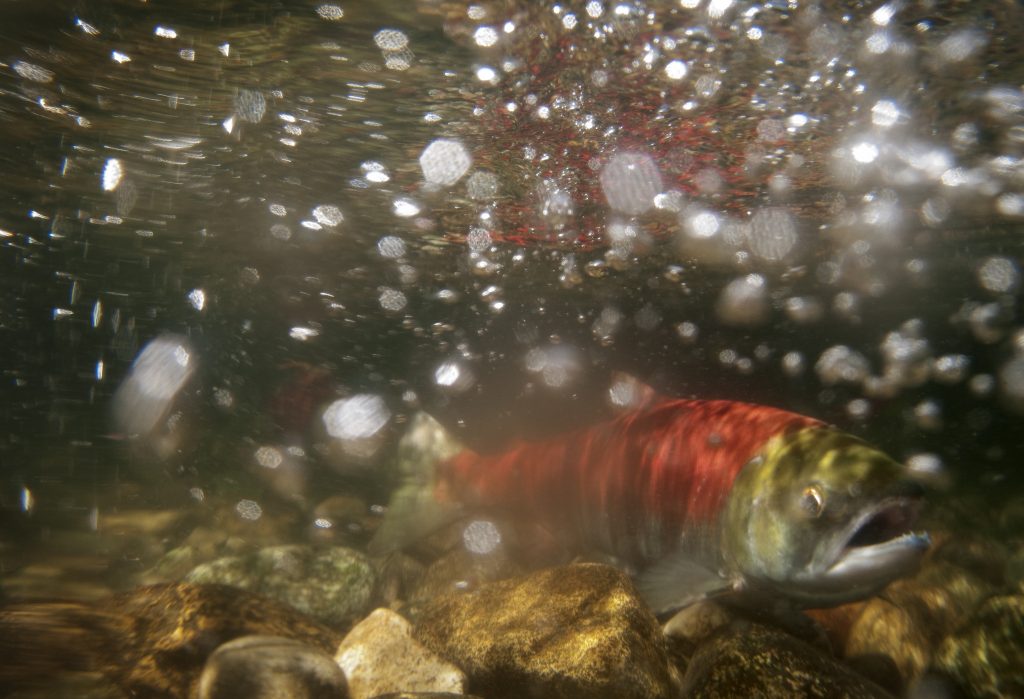
17 salmon farms to be transitioned in BC’s Broughton Archipelago
December 14, 2018
By Aquaculture North America Staff
The B.C. provincial government and First Nations in the Broughton Archipelago of B.C., have decided to not renew the leases of 17 salmon farms owned by Marine Harvest Canada and Cermaq in the area.
 A ground-breaking government-to-government process has delivered recommendations that will protect and restore wild salmon stocks
A ground-breaking government-to-government process has delivered recommendations that will protect and restore wild salmon stocks “Our governments have come together to help revitalize and protect wild salmon, and provide greater economic certainty for communities and local workers,” stated Premier John Horgan in a release. “These are the kinds of gains true reconciliation can deliver.”
The decision was agreed upon and is being supported by both Cermaq and Marine Harvest.
“We approached these discussions seeking solutions that would both address the concerns of the First Nations and maintain our commitment to the well-being of our employees, support businesses and stakeholders,” said Diane Morrison, managing director of Marine Harvest.”Going forward, we see the implementation of the recommendations as a positive step toward building mutual goodwill, trust, and respect as we work to earn First Nations consent of our operations in their Territories.”
Marine Harvest has operated farms in the Broughton area for 30 years and said this plan will allow the company to focus on growing healthy fish and engaging communities in a meaningul way.
RELATED:
BC announces landmark changes in salmon farm licensing policy
20 salmon tenures avoid chopping block
“We are pleased to move forward, together, in a way which will help to protect and enhance wild salmon populations and ensure the continued sustainable and responsible production of farmed salmon for generations to come,” said David Kiemele, managing director of Cermaq Canada. “We are also committed to participating in the creation of the Indigenous monitoring and inspection program which establishes transparent oversight of our operations.”
John Paul Fraser, executive director of the BC Salmon Farmers Association, says the “historic agreement founded on reconciliation… creates new opportunities between industry and First Nations in the Broughton Area.”
The plan is to transition 17 fish-farm sites between 2019 and 2023. Some will be immediately decommissioned and some will continue operating for between two and four years.
Ten farms will no longer be operating by the end of 2022, the release stated. And the remaining seven farms will cease operations as well unless First Nations-industry agreements and valid Fisheries and Oceans Canada (DFO) licences are in place by 2023.
“Our Nations, together with many British Columbians, have been raising serious concerns about this industry for decades. We are grateful that governments and industry are finally starting to listen and work with us to find solutions that aim to protect and restore wild salmon and other resources,” said Chief Robert Chamberlin, Elected Chief Councillor of the Kwikwasut’inuxw Haxwa’mis First Nation and First Nations’ Chair of the steering committee. “There is much that still must be done, but these recommendations are a significant positive step in a better direction.”
(Edited on December 17 to include comment from the BC Salmon Farmers Association.)
Advertisement
- Canadian aquaculture science panel reports findings
- Shutting down fish farms a simplistic solution, says fish farmers group





